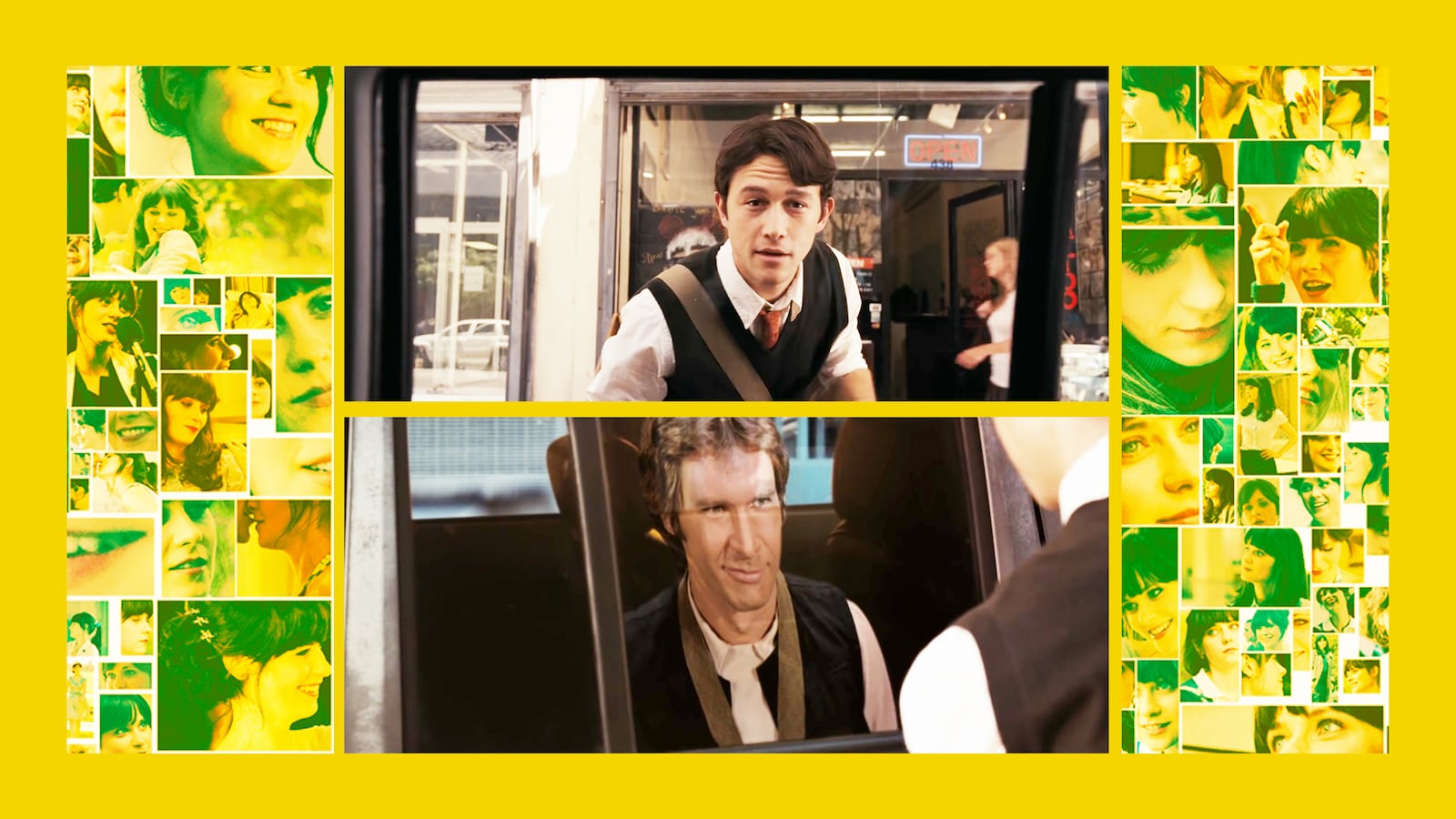Few things are felt as viscerally as the sting of heartbreak and few movies manage to capture that same confusion, bewilderment and raw pain as well as (500) Days of Summer. Released in 2009, Marc Webb’s feature debut has become a soothing balm for the recently dumped. With its slick storytelling, potent emotive beats and indie earworm soundtrack, it plays more like a mood movie than the coming-of-age dramedy it was originally intended to be.
Told in non-chronological chunks that shoot between moments of dizzying joy and rock-bottom sorrow, Webb follows the lifecycle of a rocket romance between hopeless romantic Tom (Joseph Gordon-Levitt) and his free-spirited co-worker Summer (Zooey Deschanel). Delivered from Tom’s perspective, it’s likely helped countless male viewers find peace with their own failed past relationships, which is an apt legacy considering how much Webb related to its core message.
“I was so close to the feelings Tom was feeling,” admits Webb, remembering his pre-(500) Days of Summer self. “I felt so deeply connected to this romantic idea of what love was supposed to be so it was easy to see myself in the piece and operate with an expertise and sensitivity to Tom and, to a degree, Summer. I remember how deep those feelings were and the wounds surrounding love. I have deep sympathy for people who have been in that position. It’s painful and nostalgic at the same time. It really described me at a certain point in my life.”

Zooey Deschanel, Joseph Gordon-Levitt, and Marc Webb in (500) Days of Summer.
Chuck Zlotnick/Fox Searchlight PicturesThat last line probably sums up the way many feel about (500) Days of Summer. If you’re lucky enough to have emerged from the dark cloud of a painful breakup relatively unscathed, there’s something undeniably cathartic about looking back at it from a place of peace. These days, Webb’s far more concerned with his family than the ups and downs of the dating world but when he reflects on his first film, he still gets that cathartic feeling.
In hindsight, he was perfectly placed for the job. Up until the movie arrived, Webb had made a living directing music videos from some key bands from the emo scene like My Chemical Romance and The Used. However, when the demise of the music video began to rear its head, a script from then-unknown screenwriting duo Scott Neustadter and Mike Weber became his new obsession.
“I had a way in that I thought was specific,” he says of his desire to bring some of the then-underused music video techniques like split-screen into his vision for the story. “Scott, Michael and I worked on [the script] for a long time, simply because the studio was sitting there with its arms crossed for like a year and a half.” Little did they know this studio indifference would turn out to be a blessing in disguise: “I made the decision that I was going to keep working on it. We had no other choice but it gave me time to prepare and find the movie.”
The process also allowed Webb to hone in on the film’s emotional core: “I wanted to preserve a feeling I had at the end of the movie which really resonated: a surrendering of a certain worldview. It was a romantic idea of love; it wasn’t realistic and it wasn’t deeply empathetic but it was highly relatable,” reasons Webb. “I wasn’t married at the time and I didn’t have kids so it became a receptacle for any anxious energy I had. It was all because I loved it and in retrospect, [that time] was really valuable.”
Webb often jokes that the film’s gestation was so long it still hasn’t received the green light. But when it finally did get the go-ahead, he was raring to go. The process was made even easier by the natural chemistry emanating from his two leads.

Zooey Deschanel and Joseph Gordon-Levitt.
Chuck Zlotnick/Fox Searchlight Pictures“They’d known each other for a long time and had already done a movie together, Manic,” says Webb of Gordon-Levitt and Deschanel, the pair charged with bringing this doomed relationship to life. “It felt like a natural fit. We didn’t do any chemistry tests; we did one long lens shot of them sitting together on some grass in their costumes and it just felt like a movie,” he remembers. “There was something magical [about it]. I was like ‘Oh, I’m ready to go.’”
Through Tom and Summer, we see the various seasons of a relationship play out. The highs are high, like the memorable musical number set to Hall & Oates’ classic “You Make My Dreams Come True” that hits home Tom’s top-of-the-world joy at finally spending the night with Summer. Webb even invited a familiar face along to underpin this moment of elation.
“I had to write a letter to Harrison Ford,” Webb reveals, recalling how he convinced the Star Wars icon to lend his likeness to a brief moment where Tom’s reflection is replaced with Han Solo. “He said yes and Fox said yes because they had the Star Wars rights at the time. I think it was written as somebody else, maybe Paul Newman—but Han Solo felt so much better.”
Despite being initially unsure of how this musical segue might play, the scene proved a quick hit with fans: “When that came on at Sundance, people flipped.” It also helped bridge the gap between his previous music video life and his new feature filmmaking career: “Tracy Phillips, who played Helena in one of my My Chemical Romance videos, was assistant choreographer and right there in front [of that scene],” smiles Webb. “There are so many vestiges of my music video career that flowed into (500) Days of Summer.”
However with the highs also came the lows, which were just as relatable. A trip to Ikea is framed first as a moment of wishful-thinking future married life roleplay and second as a clear sign of a relationship in decay. It’s another moment that Webb wasn’t sure of at first. “I came home [from that shoot] and threw up because I was so nervous,” he says, remembering its long, Red Bull-fuelled night shoot. “It was a fantasy of what Tom thought life could be but one that wasn’t real. He was taking it seriously and I think [Summer] was viewing it somewhat ironically,” he says of the couple’s differing interpretations of the same sequence. “I love that people reacted to it. It’s had a resonance, which surprised me.”
In the 15 years since its release, entire Reddit threads have been dedicated to unpicking the movie’s depiction of failed romance. Particular thought has been given to its penultimate scene, where Tom seemingly finds solace with a now-married Summer when the couple run into each other at their old park bench hangout. While some take this touching moment at face value, others posit that the exchange takes place entirely in Tom’s head, marking day one of his new, post-Summer life.

Zooey Deschanel, Joseph Gordon-Levitt, and Marc Webb in (500) Days of Summer.
Chuck Zlotnick/Fox Searchlight Pictures“I don’t know that there’s a right or wrong answer to that,” suggests Webb. “I’ve had dreams where there’s been a scene missing from my own life and it’s helpful. It closes the bridge and ties the loose ends. I find Summer virtuous, generous and thoughtful in that scene and I wouldn’t want to take that from the character and say it’s all in Tom’s head,” he continues, “but I don’t mind that interpretation. It’s art and you can interpret it any way you see fit.”
While his current life couldn’t be further from the thirtysomething who poured his everything into bringing (500) Days of Summer to the screen, like the audiences who have adopted it, Webb appreciates the therapeutic power of revisiting old feelings every once in a while. “It’s interesting how our life focuses on different things,” he says, “but from time to time I can sit there, relax and conjure those little feelings and feel both the joy and the sadness mingling together.”






